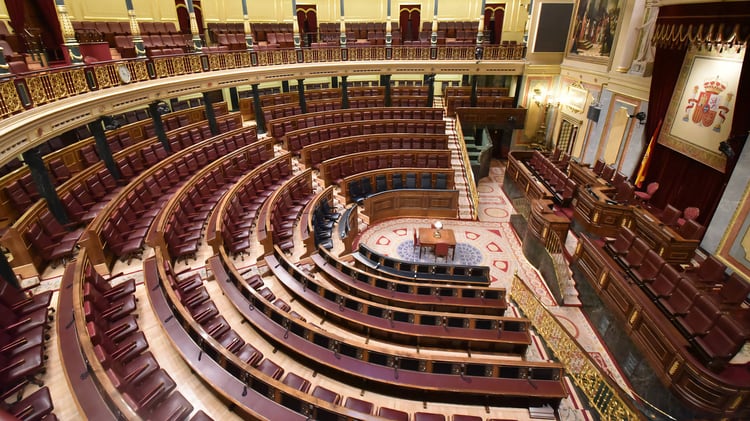Ángel Collado
Three months after the general elections, Pedro Sánchez is keeping parliamentary life paralysed in Congress, with no date for another investiture session or possibility of control of the government in office, while waiting to close his agreements with the former president of the Catalan Generalitat and fugitive from justice, Carles Puigdemont.
Socialist Francina Armengol became president of Congress on 17 August with the votes of the left-wing bloc and all the pro-independence groups against the candidate of the majority group in the House, Cuca Gamarra (PP), and since then she has been following the instructions of her leader, who is bogged down in negotiations with the Catalan separatists, to the letter.
Armengol does not call the investiture plenary because Sánchez does not yet have the necessary support to be elected, but neither does she allow the initiatives to scrutinise the work of the executive or any debate that would bother her leader.
It has been 67 days since the legislature began, the Cortes was constituted and all MPs began to be paid as such. Since then, MPs have limited their work to voting in the plenary session of the failed investiture of Alberto Núñez Feijóo on 29 September. No legislative, study or internal organisation committees have been set up in Congress.
Armengol applied the separatists’ first demand to Sánchez, the use of regional languages in Congress on an equal footing with the common official language (Castilian), without it being dealt with in the regulations committee, which is the first logical step for change and had not even been constituted. The president of the Cortes implemented it on her own as soon as she was elected, and once it was up and running it was approved in plenary.
The socialist leader undisguisedly serves Sánchez’s interests despite the theoretical independence that the post of president of the Cortes gives her. She set the date for Feijóo’s investiture plenary the day after the leader of the Partido Popular was proposed as a candidate by the King. In the case of the Secretary General of the PSOE, he has been delaying his decision for three weeks.
Negotiations by the incumbent head of government to repeat in office have stalled. He needs time, although he is not even counting on that, and Armengol is giving it to him with a practical closure of the Congress that curtails the work of the opposition. The PP demands explanations from Sánchez and his ministers without the parliamentary channels where they would be obliged to give them being constituted.
Congress remains on the sidelines of the major national debates: the amnesty for coup perpetrators, the referendum on self-determination in Catalonia and the funding privileges that Sánchez is negotiating with his partners. And in foreign policy the socialist leader is spared from explaining the chaotic position of his cabinet in the face of Hamas’s terrorist aggression against Israel. The socialist part of the government aligns itself with Western countries and the more left-wing part (Sumar and Podemos) with the pro-Palestinian bloc of the Islamic world.
In stark contrast to the paralysis in Congress, in the Senate the PP’s absolute majority has allowed the chamber to get down to work normally. The non-legislative committees have been set up, such as the main committee, the autonomous committees, as it is a chamber of territorial representation.
Last week’s debate between presidents of regional governments, which dealt with the amnesty law for the Catalan coup plotters that Sánchez is preparing, was boycotted by the acting Executive. None of its representatives attended the commission, while the president of the Generalitat, Pere Aragonés, did show up to defend his demand for judicial impunity for those involved in the secessionist attempt of 1 October 2017 as a first step towards the referendum on self-determination.
Aragonés, leader of ERC, confirmed that the competition in pro-independence radicalism with Puigdemont’s party also complicates negotiations with the PSOE. With the 27 November as the deadline for electing the head of the Executive (if there is not a new one, the elections would be repeated), Sánchez has more difficulty in continuing with his script of taking it for granted that he won the elections, even if he lost them because he was assured of a new majority. Three months later, he still has no official support other than that of Bildu and is awaiting Puigdemont’s final word.






